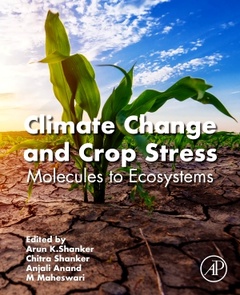Climate Change and Crop Stress Molecules to Ecosystems
Coordonnateurs : K.Shanker Arun, Shanker Chitra, Anand Anjali, Maheswari M.

Climate Change and Crop Stress: Molecules to Ecosystems expounds on the transitional period where science has progressed to ?post-genomics? and the gene editing era, putting field performance of crops to the forefront and challenging the production of practical applicability vs. theoretical possibility. Researchers have concentrated efforts on the effects of environmental stress conditions such as drought, heat, salinity, cold, or pathogen infection which can have a devastating impact on plant growth and yield. Designed to deliver information to combat stress both in isolation and through simultaneous crop stresses, this edited compilation provides a comprehensive view on the challenges and impacts of simultaneous stresses.
1. Breeding Climate Resilient Crops for Abiotic Stresses 2. Drought and Heat stress in combination in a changing climate 3. Elevated atmospheric CO2 induced changes in nitrogen metabolism and crop quality 4. Combined Salinity and Waterlogging Stress in Plants: Limitations and Tolerance Mechanisms 5. Drought stress in sorghum: impact on grain quality 6. Drought stress tolerance in Cotton: Progress and perspectives 7. Root System Architectural and Growth Responses of Crop Plants to Mineral Nutrition Under Moisture Stress and its Implications in Drought Tolerance 8. High temperature stress in wheat due to climate change, effect, plant breeding strategies 9. Relevance of Ear and Ear-Related Traits in Wheat Under Heat Stress 10. Air Pollution Mitigation and Global Dimming: A Challenge to Agriculture under Changing Climate 11. Insights into the Physiological and Biochemical Responses to Abiotic Stress during Seed Development 12. Cereal grain composition under changing climate 13. Molecules to Ecosystems - Recent Trends in Chemical Ecology for Combating Biotic Stresses in a Changing Climate? 14. Chloroplast Evolution and Genome Manipulation 15. Seed priming to enhance salt and drought stress tolerance in plants: Advances and Prospects 16. Molecular Approaches for Improving Abiotic Stress Tolerance in Sugarcane 17. Carbon Isotope Discrimination Studies in Plants for Abiotic Stress 18. DNA Methylation in Plants and Its Role in Abiotic Stress Tolerance
Plant and Crop science researchers working on plant and crop stress ranging from Abiotic to Biotic stresses in the National Agricultural Research organizations like USDA, INRA, ICAR and other organisations. Professors and Researchers, Post Docs and Graduate students working in the broad area of climate change and crop stress, crop production, crop improvement and crop protection departments of various Universities all over the world. Basic scientists, molecular biologists, plant biotechnologists, physiologists and agronomists, breeders, entomologists, plant pathologists, food policy analysts and major portion of crop scientists. Students and academicians in the area of crop and agricultural science.
Dr Chitra Shanker is serving as Principal Scientist (Entomology) at the Indian Institute of Rice Research ( ICAR-IIRR) under the Indian Council of Agricultural Research (ICAR). She holds a PhD in Agricultural Entomology from Tamil Nadu agricultural University, Coimbatore. She has been with ICAR from 1994 and has worked in various places in India. She is an Endeavour Executive Fellow of the Department of Education and Training, Government of Australia and has been awarded the Commonwealth Star by the Australian Government. Dr Chitra Shanker has been working on habitat management strategies to enhance biological control in rice. Her field of specialization is the study of the biodiversity of agroecosystems, their functional significance and utilizing the ecological services provided by this bio
- Presents a multidisciplinary view of crop stresses, empowering readers to quickly align their individual experience and perspective with the broader context
- Combines the mechanistic aspects of stresses with the strategic aspects
- Presents both abiotic and biotic stresses in a single volume
Date de parution : 11-2021
Ouvrage de 598 p.
19x23.3 cm
Thèmes de Climate Change and Crop Stress :
Mots-clés :
?Abiotic stress; Abiotic stress tolerance; Air pollution; Amino acids; Antioxidative defense; Awns; Biotic stress; Canopy temperature; Carbon fixation; Carbon isotope discrimination; Cereals; Chlorophyll fluorescence; Chlorophyll stability; Chloroplasts; Climate change; Climate-resilient crop; Cotton; DNA methylation; Drought; Drought cum heat stress; Drought stress; Drought tolerance; Ear photosynthesis; Ear temperature depression; Elevated CO2; Environmental impact; Epicuticular wax; Female gametophyte; Field crops; Flood; Genetic; Genetics engineering; Genome editing; Genomes; Germplasm; Global dimming; Glume; Grain composition; Grain growth rate; Grain quality; G×E interactions; Heat tolerance; High temperature; High throughput technologies; Hormones; Hydration; Hypoxia; Ion toxicity; Ionome; Lipids; Male gametophyte; MeDIP; MiRNAs; Morpho-physiological growth; Nitrogen; Nitrogen dioxide; Nutrients; Nutritional quality; Organelles; Ozone; Pathways; Plant breeding strategies; Plants; Protein; RNS; ROS; Root architecture; Root growth; Salinity; Seed development; Seed priming; Sorghum; Starch; Stomatal density; Stomatal regulation; Stress tolerance; Sulfur dioxide; Suspended particulate matter; Temperature stress; Thermotolerance; Tolerance; Transcription factors; Transgenes; Transpiration efficiency; Water use efficiency; Waterlogging; Wheat crop; Yield



